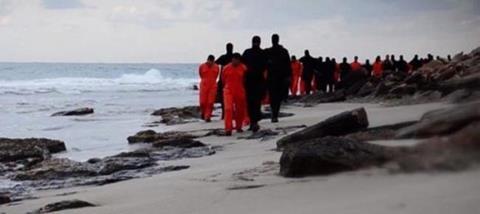
As the US government considers pulling out of Syria, Christians in the Middle East are marking the anniversary of an event that secured Islamic State a place in the terrorist hall of infamy.
Four years ago, as the world watched in horror, ISIS militants beheaded twenty-one orange-clad men on a Libyan beach. The propaganda video sparked worldwide outrage. But if its goal was to instil fear among the region’s Christians, that attempt has backfired spectacularly.
In search of the 21
It was a picture on the cover of a magazine that first drew me into the story of the twenty-one men in orange: it showed the head of a lean youth with brownish skin, a sharp hairline and a light mustache. His eyes were half closed, his lips slightly parted.
At first I didn’t realise that this head had been separated from its body.
In the February 2015 video, filmed by ISIS and released on YouTube, we see him alive. He kneels in an upright position before his executioner. His gaze seems to be directed at the beach in front of him, as though he wants to take in every last detail.
I have since learned his name: Kiryollos Boushra Fawzy, born November 11, 1991, in the same Egyptian village that was home to thirteen of the twenty-one victims. Kiryollos was not famous when he was alive; he was just one more young man who couldn’t find work in his own country. That did not prevent him from becoming one of the newest saints of the Coptic Orthodox Church.
The Copts and their rich history and traditions, which date back the first century AD, are not well known in the West. How could I get closer to these men, to find out more about their origins, their individual characters, and the community that shaped them? I decided to travel to Egypt to see the homes they had left when they set out for Libya and to meet their families for myself—an encounter I detail in the book The 21: A Journey into the Land of Coptic Martyrs.
I was welcomed into humble homes where the saints’ widows and children share space with their livestock. Invariably relatives offered to show me the entire uncut video on an iPad. In each home I watched the video – surrounded by the men’s families and runny-nosed children, in rooms adorned with images of the crowned Twenty-One, while a goat poked its devilish-looking head through the doorway and a calf next door wauled for its mother.
What would the murderers say about their video being shown like this? Would it surprise them to see how unflappable these poor folk were; that these people had managed to turn an attempt at triggering boundless terror into something entirely different? Would they be able to see that their cruelty had failed to achieve its intended goal, that their attempt to intimidate hadn’t succeeded?
Never did I hear any talk of revenge, but only the pride of having a martyr in the family, a saint in heaven. We westerners are strangers in this world in which facing persecution with courage is part of daily life.
That’s because ISIS isn’t the main, or only, threat that Egypt’s Copts have to fear. ISIS, after all, targets many other groups as well as Christians, and is the sworn enemy of every government in the region. Long before the black-clad terrorists appeared, Copts have faced discrimination, harassment, and pogroms going back 1400 years.
Lest we forget
Even as we debate the US exit from Syria, then, we in Western countries should be realistic about the limits of our influence. It might be tempting to think that what the Copts and other persecuted religious minorities need is for Western powers to intervene with weapons, air strikes and troops. But any interference by nations perceived as Christian is likely to only worsen the fate of Middle Eastern Christians.
And democracy is unlikely to solve their problems either. In fact, for centuries Middle Eastern Muslims and Christians lived peacefully side by side, even if the Christians had to settle for second-class treatment. The Middle East became far more dangerous for Christians with the Westernising push of modernisation, and things grew dramatically worse following the Arab Spring, an uprising of democracy that empowered Muslim majorities and extremist elements.
Anyone hoping to help Eastern Christians should see to it that they aren’t forgotten, as they have been in the past. Beyond that, hard as it is for westerners to accept, there isn’t any quick solution to a situation that dates back more than a millennium. We certainly aren’t going to ride in on a white horse and fix it for them. Perhaps we should admit that the best we can do is stay away and pray.
Martin Mosebach is an author of several books, including The 21: A journey into the land of Coptic martyrs




























